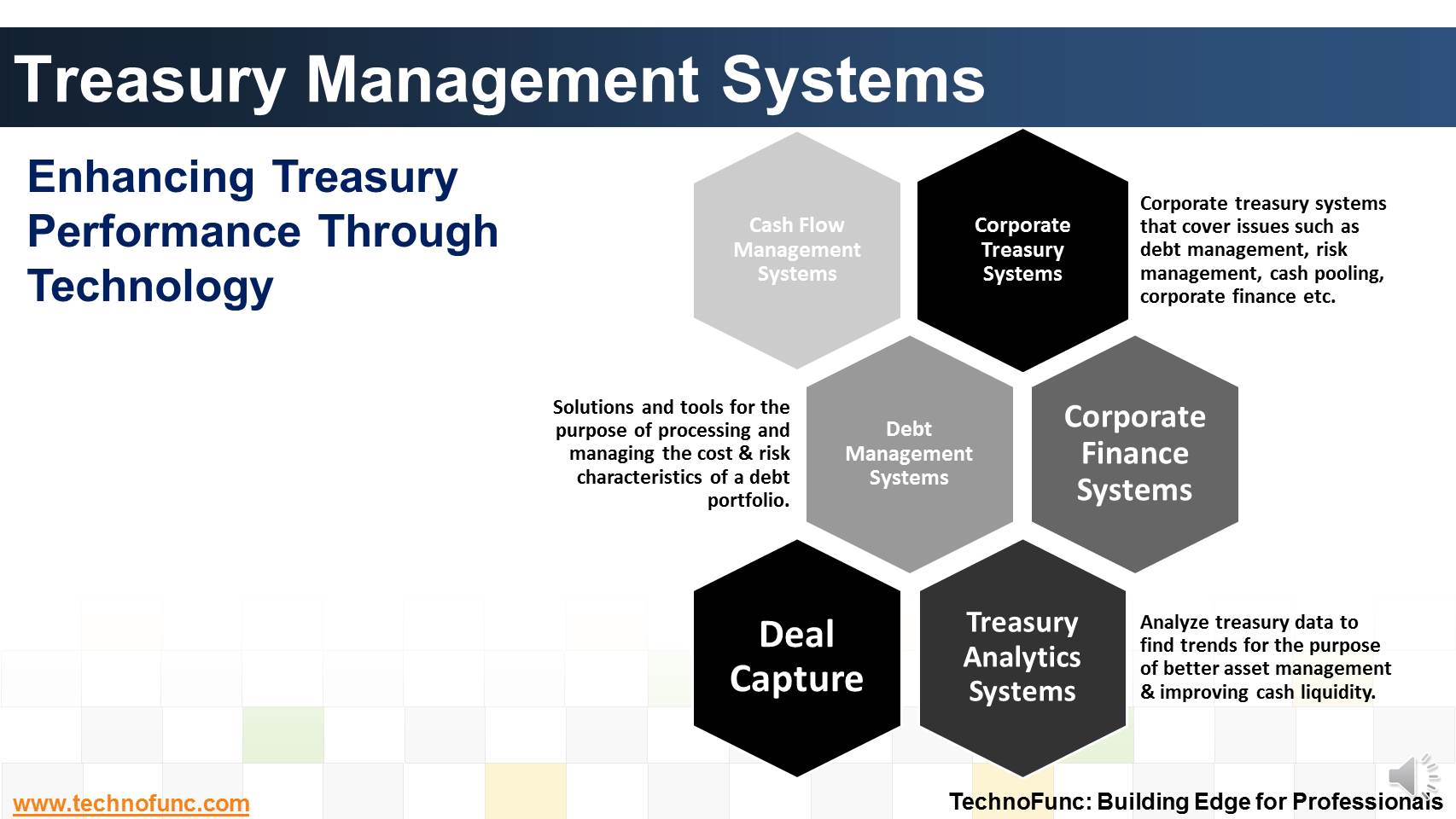- Home
- Business Processes
- Industry Knowledge
- Aerospace Industry
- Automotive Industry
- Banking Domain
- BFSI Industry
- Consumer/ FMCG Industry
- Chemicals Industry
- Engineering & Construction
- Energy Industry
- Education Domain
- Finance Domain
- Hospitality Domain
- Healthcare Industry
- Insurance Domain
- Retail Industry
- Travel and Tourism Domain
- Telecom Industry
- Leadership Skills
- eLearning
- Home
- Functional
- Treasury Management
- Treasury Management Systems
Treasury Management Systems
Technology has enabled the treasury function by providing various solutions to manage it's complicated tasks. This article explains various types of treasury management systems available in the market.
Treasury systems can provide a whole host of benefits to a corporate treasury.
Given below are commonlly used solutions for treasury management:
Corporate Treasury Systems
Corporate treasury systems that cover issues such as debt management, risk management, cash pooling, corporate finance etc.
Cash Flow Management Systems
These products enable companies to manage the flow of finance by monitoring and analyzing revenues and expenses. They provide tools for cash flow analysis and forecasting to ensure and maintain solvency and liquidity by helping improve the flow of finances.
Debt Management Systems
Solutions and tools for the purpose of processing and managing the cost & risk characteristics of a debt portfolio while evaluating payments.
Corporate Finance Systems
Software and services designed for managing corporate finances by analyzing data pertaining to funds, transactions, foreign exchange rates & market data.
Deal Capture Systems
Software and systems that deal with processing and capturing financial trades and also provides real-time information such as news and prices to enable right decision making.
Treasury Analytics Systems
Analyze treasury data to find trends for the purpose of better asset management & improving cash liquidity.

Related Links
You May Also Like
-
Treasury Management - Functions
Treasury management has become an specialized function. Treasury function helps in managing the Risk-return profile as well as the tax-efficiency of investment instruments. In larger firms, it may also include trading in bonds, currencies and financial derivatives. Learn about the various tasks, activities and imperatives, undertaken by treasuries in in today's context.
-
The terms Treasury Management and Cash Management are sometimes used interchangeably, while, in fact, the scope of treasury management is larger and includes funding and investment activities as well. Learn all about Treasury Management here!
-
Treasury Management - Benefits
Effectively using treasury management with cash management and trade finance products brings tangible benefits to both corporates and financial institutions. Let us discuss some tangible benefits of treasury function.
-
The objective of funding Management is to implement strategies that lead to the best borrowing rates and lower investment costs. Learn how treasury aids in loans and investment management functions.
-
The Cash Management component ensures that the enterprise has sufficient liquidity for payments that are due and to monitor payment flows. Learn how treasury plays an important role in cash management for the enterprise.
-
Although there is no straight forward answer to the question, how to best organize a treasury function, this article provides an generic view of the way large MNCs creates departments or sub-functions within the treasury function.
-
Technology has enabled the treasury function by providing various solutions to manage it's complicated tasks. This article explains various types of treasury management systems available in the market.
-
The objective of Financial risk management is to protect assets and cash flows from any risk. Treasury function works to accurately assess financial risks by identifying financial exposures including foreign exchange, interest rate, credit, commodity and other enterprise risks. Learn about the various risks that are managed by treasury.
-
Treasury has increasingly become a strategic business partner across all areas of the business, adding value to the operating divisions of the company. Managing activities that were traditionally carried out within the general finance function. Learn about the drivers for this change.
Explore Our Free Training Articles or
Sign Up to Start With Our eLearning Courses

About Us
Learning
© 2023 TechnoFunc, All Rights Reserved










